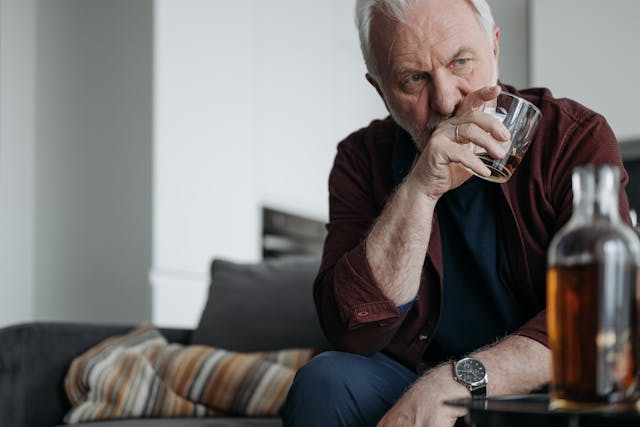
Experiencing or witnessing a profoundly distressing or threatening event can lead to the development of post-traumatic stress disorder, commonly known as PTSD. When you have PTSD, you get very anxious. Also, you have nightmares or relive the event that caused you to feel like that. Very often, it’s too much to take. To go through this, you might begin drinking. You might even try extremely dangerous substances just to be able to cope with your emotions. That is how you become dependent on substances. We will show you how PTSD and addiction are connected and how they make each other worse. When you understand this, you will make informed decisions, ask for professional help, and start living healthier lives.
What is PTSD?
Post-traumatic stress disorder (PTSD) is a mental health condition. It is triggered when you experience or witness a traumatic event. Many signs of trauma can help you recognize this condition. You might get flashbacks of that event, see nightmares, or feel severely anxious. Also, you might have uncontrollable thoughts about it.
Some common triggers of PTSD are:
● Military combat
● Serious accidents, like car crashes
● Natural disasters, like floods or earthquakes
● Violent personal assaults, such as robbery or attack
● Abuse or domestic violence.
How PTSD affects daily life
It is not easy to live with PTSD. What happens is - you feel scared or nervous, even in safe situations. You tend to avoid places or people that bring back the memories connected to the trauma. Your sleep gets disrupted, as well. You can’t concentrate, and you feel angry and irritable. Much of the time, you feel sad.
Of course, having these feelings makes it hard to do everyday activities. For example, working, going to school, or even socializing is difficult. Unfortunately, your relationships suffer, as well.

What is addiction?
Addiction is a serious condition where you become unable to stop using a substance, even though it causes harm to your health, relationships, and daily responsibilities. You change your brain’s reward system when you use the substance repeatedly. That makes your brain dependent on the substance. You can become addicted to many different substances, such as:
● Alcohol,
● Prescription drugs like painkillers or sedatives,
● Illegal drugs like heroin, cocaine, or methamphetamine,
● Nicotine, found in cigarettes and vaping products.
How addiction starts and affects your life
Addiction starts with the repeated use of a substance. At first, you feel the effects of the substance strongly. Then, when you start using regularly, your body becomes tolerant. This tolerance means that you now need higher amounts of the substance to get the same feeling. The substance becomes a central part of your life as you consume more. This dependence on the substance can spiral into addiction.
Once addiction takes hold, it can disrupt various aspects of your life. Here are some of its effects:
- Health complications: Chronic use can lead to severe health issues such as heart, lung, and liver diseases.
- Relationship strain: Behavioral changes associated with addiction can damage your relationships with loved ones.
- Performance issues: Addiction can impair your focus and productivity, causing problems at work or school.
- Economic strain: The costs of sustaining an addiction can lead to financial hardship.
- Legal troubles: Efforts to acquire more substances can sometimes result in legal issues.
How PTSD and addiction are connected, and their impact
How do PTSD and addiction relate? Experiencing PTSD often entails grappling with overwhelming feelings of unease, tension, or profound melancholy. These emotions can become so overwhelming that you might feel trapped or powerless. Seeking solace, one might turn to substances like alcohol or drugs for temporary respite. This transient respite underscores the direct link between PTSD and addiction. For instance, if recurrent nightmares disrupt your sleep, indulging in alcohol may momentarily offer a sense of escape, aiding in relaxation and reducing feelings of overwhelm. Nevertheless, this respite is brief and can swiftly foster a dependency on such substances merely to restore a semblance of equilibrium.

Impact of PTSD and addiction on health
When you suffer from PTSD and addiction in combination, the risk of heart disease is higher. That happens because there are harmful effects of substances that go together with stress. Your liver gets damaged, too. It processes the substances you use, especially if you use a lot or very often. Furthermore, stress and using drugs and alcohol will weaken your immune system. That puts you in a bad position when your body needs to fight infections. Not only that, you get distracted from PTSD symptoms, and substances impair your judgment, which causes accidents and injuries.
There are mental health risks as well. After a very short period, when substance abuse reduces your PTSD symptoms, it starts making them even worse. You are more likely to become depressed. Also, substances affect your cognitive functions. You cannot think anymore, you forget important information, and you can’t make the right decisions.
Treatment options for PTSD and addiction
You need treatment from professionals who know how PTSD and addiction are connected. One important thing about treating PTSD and addiction is to treat them together. When only one condition is addressed, the other condition might continue to affect you. Some effective approaches are:
● Trauma-focused cognitive behavioral therapy (CBT): This helps you identify and change negative thinking and behaviors. It can address both trauma responses and patterns of substance use.
● Eye movement desensitization and reprocessing (EMDR): This therapy is specifically aimed at treating trauma and can be very helpful in processing and reducing the distress from traumatic memories.
● Group therapy: Participating in group sessions can provide support from peers who are dealing with similar issues, which can reduce feelings of isolation and shame.
Choosing the right treatment: The benefit of inpatient rehab facilities
For individuals grappling with the combined challenges of PTSD and substance addiction, the choice of treatment environment is important. Consequently, many New York residents opt for treatment in New Jersey, seeking the quieter, more focused, and often more affordable settings that facilities there can offer, away from the hustle and intense pace of their home state. By choosing a specialized inpatient rehab facility in New Jersey, NY locals can access tailored care that fosters recovery in a conducive environment. These centers offer a controlled environment that is crucial for those who are dealing with severe manifestations of PTSD and dependence on substances. These facilities' continuous access to medical and psychological assistance is indispensable during the initial recovery stages.
Choosing a rehab center in New Jersey, away from the familiar settings of NYC, can also provide strategic benefits. It helps individuals distance themselves from environments that may trigger their PTSD symptoms or substance use, thereby increasing the effectiveness of the recovery efforts. The proximity of New Jersey to New York facilitates family involvement in the recovery process, allowing for regular therapy participation and visits, which are essential components of successful rehabilitation.
Enrolling in an inpatient rehab center can profoundly impact an individual’s recovery trajectory. These centers are specifically prepared to manage the dual diagnosis of PTSD and addiction by implementing therapies designed to address both conditions comprehensively. This holistic approach is crucial as it targets the underlying and overt aspects of the disorders, laying a strong foundation for sustained recovery.
Social support will help you
A study approved by the Institutional Review Board (IRB) at the Medical University of South Carolina shows that you can benefit from social support. There is a greater decrease in the use of substances and PTSD symptoms during treatment when a person has strong social support. It can make treatment more effective.
Look for lasting solutions
We know that drinking and using drugs make you feel better when you cannot cope anymore. However, it is a quick fix. In the long run, it leads to more problems than you think it solves. You get addicted and create a cycle that makes your PTSD symptoms even worse than before. Now that you know how PTSD and addiction are connected, you ought to get help from healthcare experts who understand how PTSD and addiction are connected. They will guide you and help you explore your triggers and traumas, and eventually, you will better your relationships and improve your performance at work or school. You will get to live a more fulfilling and enjoyable life.